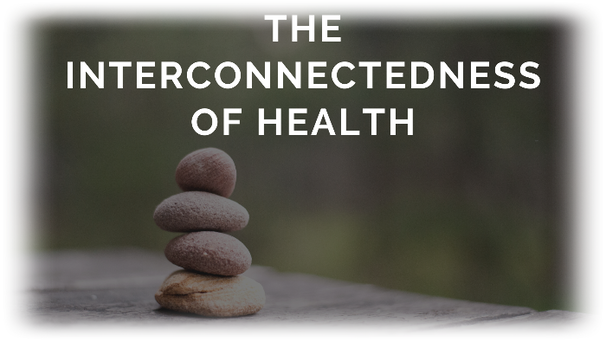|
The modern-day health landscape often likes to view different aspects of our well-being in unison. The idea that the manipulation of a single variable, for instance exercise, will by itself dramatically improve our overall well-being is on the whole, well-received. Provide simple, straightforward solutions to the complex issue of people’s health - that’s often the approach. I can understand the reasoning; if you complicate things too much, a lot of people simply won’t even bother. I get it. But, thing is, when it comes to health we simply can’t afford to overlook the interconnectedness of all of the variables at play. And there’s a lot of them. A key part of both my service & content is the reinforcement of the interconnectedness of the aspects of health. What do I mean by this? Essentially, that each of the key components of our well-being affect one another. Allow me to dig a bit deeper into some examples. SLEEP AFFECTS EXERCISE
EXERCISE AFFECTS STRESSThrough consistent & frequent exercise we’re able to lower our cortisol levels, subsequently decreasing stress. It does this directly, but also via improved sleep which also has a cortisol reducing affect (our sleep is improved when we’re more active). Exercise also provides us with a greater capacity to manage stress in our lives. It does this primarily through neurological changes. It boosts dopamine storage & triggers creation of dopamine receptors in the reward center of the brain. This basically means it raises both our willpower & focus to do things that we don’t normally feel rewarding. Obviously, if this can mean we’re able to be more productive & feel less overwhelmed by any outstanding tasks we’ve got going on, it’s going to reduce our stress. A final key way in which I believe exercise helps us manage stress is that it puts us in a temporary, small state of physiological stress. The same way our body responds to stress we place on it - growing in response - I believe our minds do the same. By experiencing the discomfort of physical exercise, our mind becomes more capable of dealing with discomfort in other forms moving forward. STRESS AFFECTS NUTRITIONAL DECISIONSStress affects our nutrition, predominantly through behavioural decisions. Think about it, what happens when you’re feeling stressed-out from work? First, your mood suffers. Naturally, you’ll seek out a means of improving the mood you’re in. For a lot of people, comfort food is the answer. For others, it might be alcohol. Either way, we turn to unhealthy, nutritionally-empty foods, in a faint attempt to alleviate the stress & improve our mood. Short-term, yeah maybe it helps, but long-term it’s only serving to worsen the problem. What's more with the worsened sleep that arises as a result of elevated stress, certain hormones that are directly implicated with our consumption become affected. Leptin levels (which signals to satiety to the brain) are reduced, whilst ghrelin levels (which signal hunger to the brain) are spiked. This in turn makes us feel more hungry, even when we're not actually in need of food, which of course can lead to weight gain & all sorts of issues. NUTRITION IMPACTS STRESSTo reverse the previous point, our nutrition also affects our stress. When we fuel our body poorly we understandably feel lethargic, low on energy, & lacking in motivation. This is because these foods don’t provide us with the nutritional content needed for optimal, or even good, functioning. Resultantly, we are going to struggle to find the initial drive & energy to be active, & even if we do manage to, our performance is going to be sub-par. I’ve already outlined how compromised exercise affects our stress. Our diet also plays a more direct role in our stress levels. Caffeine, the stimulant drug found in coffee & tea, can spike cortisol levels pretty significantly. What’s more, caffeine negatively impacts both our ability to get to sleep & the quality of it once we do fall asleep - elevating cortisol. Sugar also plays a key role. When we consume foods high in sugar (often a result of stress in the first place), our blood sugar levels spike - providing a temporary rush of energy & positive feeling. However, soon after those blood sugar levels will crash, leading to irritability, lethargy, & general poor mood. MULTI-DIRECTIONAL RELATIONSHIPSHopefully this handful of examples I’ve provided here can provide you with at least a small insight into the interconnected relationships that exists between each of these crucial aspects of health.
I think it’s important that we as a culture take the time to understand & recognise that our well-being isn’t as black-and-white as it’s often portrayed. There are multiple variables that bounce off each other, and each requires attention. Given that they all affect each other in so many ways, I understand that it can seem complicated, overwhelming, & you might be wondering where you should start. But, the good thing is that by simply taking the time to focus on & improve one aspect of your health, you’ll naturally experience improvements in the others, but you’ll also begin to feel more capable of manipulating the others. |
Author
Christian Lawal Personal Training.
Personal training in Tunbridge Wells, Tonbridge & Sevenoaks. Archives
January 2024
|




